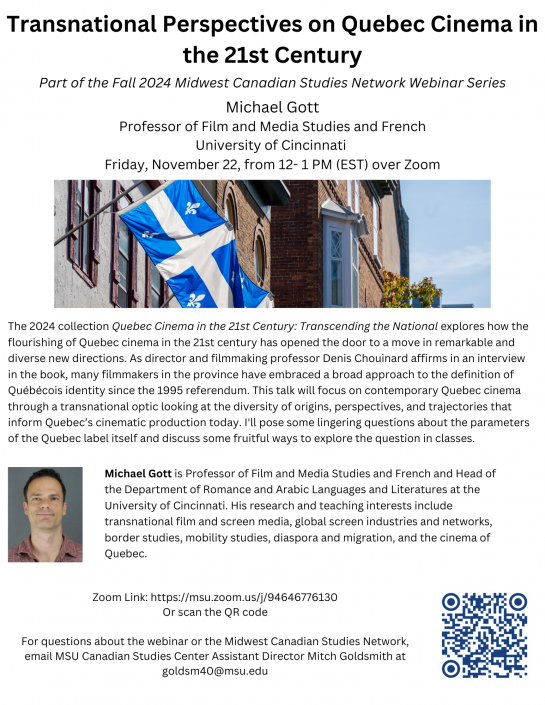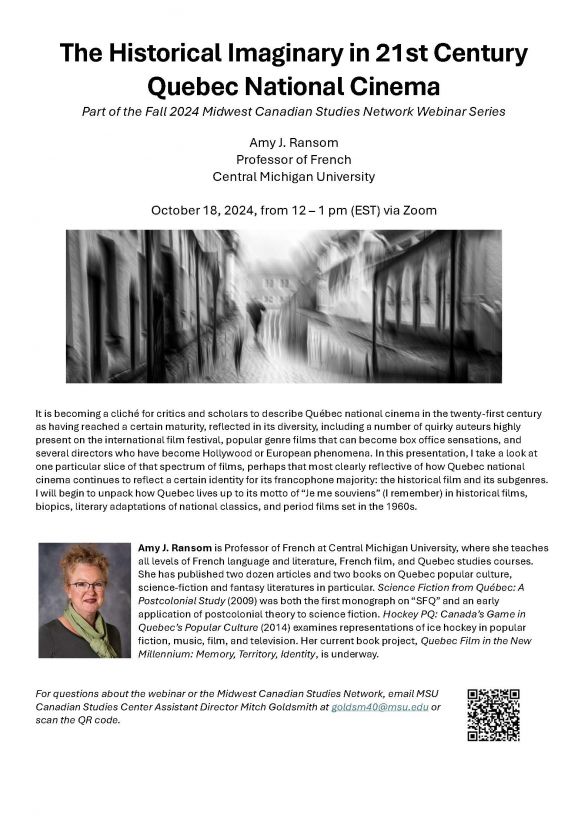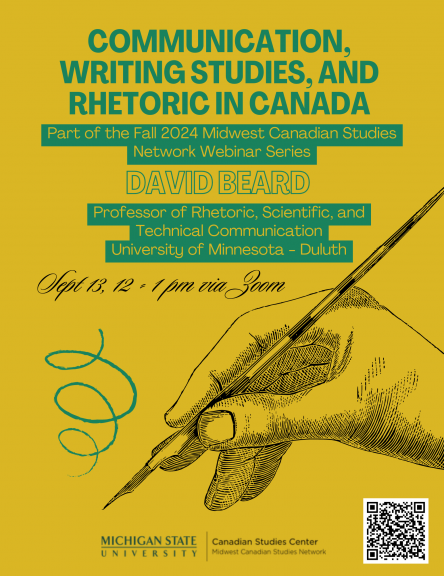The Midwest Canadian Studies Network brings together Canadian studies scholars from across the US Midwest under the auspices of the MSU Canadian Studies Center. The Network provides a venue for scholars to present their research and share news about the field. Network events are open to students, scholars, and members of the public, providing a vehicle for faculty and graduate students to share their Canada-related work and to promote the field for the next generation of Canadianists.
For more information about the network or to join, please email the Canadian Studies Center at .
Sponsored by the Midwest Canadian Studies Network
Friday, March 14, 12- 1 PM (EST) via Zoom

Photo: Rhymes for Young Ghouls (2013), Prospector Films
Cinematic representations of Indigenous mothers have long relied on colonial stereotypes depicting them as troubled young women, unwilling or unable to care properly for their children. Absent and “bad” mothers are omnipresent in Indigenous films as well, and while some of these representations may at first seem complicit with settler stereotypes, they often ultimately reaffirm the crucial role of motherhood in resisting cultural genocide and open onto a broader, empowering understanding of mothering and care in Indigenous communities. I discuss two films that ostensibly portray motherhood in very different ways: Jeff Barnaby’s Rhymes for Young Ghouls (2013) and Hélène Cousineau and Madeline Ivalu's Restless River (2019). I argue that both are ultimately coming-of-age narratives that challenge the trope of the "colonized mother" reduced to vulnerability and abjection, by emphasizing agency, resilience, and intergenerational connection. Without objectifying their protagonists as perfect heroes, these sovereign representations militantly depict decolonial mothers mothering under extreme circumstances.
Ioana Pribiag teaches French and Francophone studies at the University of Minnesota, Twin Cities. She is particularly interested in thought on the relationships between politics and aesthetics, and the developing dialogue between French and postcolonial theory. She has published work on Caribbean, Québécois and Indigenous authors and filmmakers. Her book project, Shards: Fragmentation in Francophone Postcolonial Literature, examines the specificities of thematic and formal fragmentation in postcolonial contexts.
Part of the 2024 Midwest Canadian Studies Network Webinar Series
Friday, January 24, 2025, from 12 – 1 pm (EST) via Zoom
Please join the Midwest Canadian Studies Network for an interactive session previewing the Association for Canadian Studies in the United States (ACSUS) 27th biennial conference on the theme “Canada: Spaces of Change” in Seattle, Washington, November 13 – 16, 2025. Led by ACSUS’ president-elect, this event will be of interest to students and faculty interested in attending the conference, as well as those interested in Canadian studies in general.
Sara Beth Keough is the current Vice President and President-elect of the Association for Canadian Studies in the United States (ACSUS). Her research has focused on urban planning in research-dependent communities and internal migration in Canada, particularly between Newfoundland and Alberta. Sara Beth was a Fulbright Scholar in Niger, and she has published extensively on water access, economies of water, and material cultures of water in West Africa. She holds a Ph.D. in Geography from the University of Tennessee and is Professor and Chair of the Department of Geography at Saginaw Valley State University.
For questions about the webinar or Midwest Canadian Studies Network, email Mitch Goldsmith at .
Part of the Fall 2024 Midwest Canadian Studies Network Webinar Series

The 2024 collection Quebec Cinema in the 21st Century: Transcending the National explores how the flourishing of Quebec cinema in the 21st century has opened the door to a move in remarkable and diverse new directions. As director and filmmaking professor Denis Chouinard affirms in an interview in the book, many filmmakers in the province have embraced a broad approach to the definition of Quebecois identity since the 1995 referendum. This talk will focus on contemporary Quebec cinema through a transnational optic looking at the diversity of origins, perspectives, and trajectories that inform Quebec's cinematic production today. I'll propose some lingering questions about the parameters of the Quebec label itself and discuss some fruitful ways to explore the question in classes.
Michael Gott is Professor of Film and Media Studies and French and Head of the Department of Romance and Arabic Languages and Literatures at the University of Cincinnati. His research and teaching interests include transnational film and screen media, global screen industries and networks, border studies, mobility studies, diaspora and migration, and the cinema of Quebec.
For questions about the webinar or the Midwest Canadian Studies Network, email MSU Canadian Studies Center Assistant Director Mitch Goldsmith at .
Part of the Fall 2024 Midwest Canadian Studies Network Webinar Series

It is becoming a cliché for critics and scholars to describe Québec national cinema in the twenty-first century as having reached a certain maturity, reflected in its diversity, including a number of quirky auteurs highly present on the international film festival, popular genre films that can become box office sensations, and several directors who have become Hollywood or European phenomena. In this presentation, I take a look at one particular slice of that spectrum of films, perhaps that most clearly reflective of how Quebec national cinema continues to reflect a certain identity for its francophone majority: the historical film and its subgenres. I will begin to unpack how Quebec lives up to its motto of “Je me souviens” (I remember) in historical films, biopics, literary adaptations of national classics, and period films set in the 1960s.
Amy J. Ransom is Professor of French at Central Michigan University, where she teaches all levels of French language and literature, French film, and Quebec studies courses. She has published two dozen articles and two books on Quebec popular culture, science-fiction and fantasy literatures in particular. Science Fiction from Québec: A Postcolonial Study (2009) was both the first monograph on “SFQ” and an early application of postcolonial theory to science fiction. Hockey PQ: Canada’s Game in Quebec’s Popular Culture (2014) examines representations of ice hockey in popular fiction, music, film, and television. Her current book project, Quebec Film in the New Millennium: Memory, Territory, Identity, is underway.
For questions about the webinar or the Midwest Canadian Studies Network, email MSU Canadian Studies Center Assistant Director Mitch Goldsmith at .
Part of the Fall 2024 Midwest Canadian Studies Network Webinar Series

In this brief presentation, Dr. Beard will share his research on the history of rhetorical studies in Canada.
The presentation ends with an invitation to join RhetCanada and other scholarly societies at the Congress for the Humanities and Social Sciences.
David Beard is Professor of rhetoric in the Department of English, Linguistics, and Writing Studies at the University of Minnesota Duluth. He has published in journals like the International Journal of Listening, Archival Science, Philosophy and Rhetoric, Southern Journal of Communication, and Enculturation, among other venues. With Heather Graves, he co-edited The Rhetoric of Oil (Routledge). With John Heppen, he has published several articles and book chapters about professional wrestling.
For questions about the webinar or Midwest Canadian Studies Network, email Mitch Goldsmith at .
Pierre Atlas, Ph.D., Paul H O'Neill School of Public and Environmental Affairs, Indiana University Indianapolis
Dr. Pierre Atlas is a senior lecturer and serves as Director of the Master of Public Affairs (MPA) program at the Paul H. O’Neill School of Public and Environmental Affairs at Indiana University Indianapolis, where he teaches graduate and undergraduate courses in public affairs and criminal justice. Prior to joining the O’Neill School in fall 2021, Dr. Atlas was Professor of Political Science at Marian University and, for 17 years, served as the Founding Director of The Richard G. Lugar Franciscan Center for Global Studies. His recent research and publications have examined the impact of (post 1865/1867) western frontier history and mythology on contemporary political differences between the United States and Canada, on issues such as Indigenous policy, violence and law and order, and gun laws and gun culture.
Kevin J. Christiano, Ph.D., Department of Sociology, University of Notre Dame
Professor Kevin J. Christiano is an associate professor of sociology and a faculty affiliate of the Higgins Labor Studies Program at the University of Notre Dame. He has been a visiting scholar in the Department of Sociology at Princeton University (1986–1987) and in the Canadian Studies Center at Duke University (1994–1995). Dr. Christiano is the author or co-author of three books: Religious Diversity and Social Change: American Cities, 1890–1906; Pierre Elliott Trudeau: Reason Before Passion; and Sociology of Religion: Contemporary Developments, with William H. Swatos, Jr., and Peter Kivisto. Professor Christiano is the recipient of the 2016 Prix du Québec from the American Council for Québec Studies and the 2019 J. Milton Yinger Award from the North Central Sociological Association.
Paul S. Ciccantell, Ph.D., Department of Sociology, Western Michigan University
Professor Paul S. Ciccantell is Professor of Sociology at Western Michigan University. His research examines a variety of extractive industries, railroad and ocean transport, and other global commodity chains. Dr. Ciccantell's Canadian research focuses on coal mining and its socioeconomic and environmental impacts in Western Canada, transport infrastructure, and the oil and gas industry.
James Endersby, Ph.D., Harry S Truman School of Government and Public Affairs, University of Missouri
Professor James Endersby is a professor of political science at the University of Missouri, having joined the university in 1991. He received his Ph.D. in 1990 from the University of Texas and specializes in American politics and government, political behavior (voting and elections), formal political theory, and research methods. Dr. Endersby served as the director of Canadian Studies at the University of Missouri. He was past president of the Southwestern Political Science Association (2015-2016) and the Midwest Association for Canadian Studies (2007-2009).
Louise-Hélène Filion, Ph.D., Residential College, University of Michigan, Ann Arbor
Dr. Louise-Hélène Filion is a literary scholar who teaches in the French, German, and Arts & Ideas in the Humanities programs at the University of Michigan’s Residential College. She has previously taught at the Université du Québec à Montréal and the Universität des Saarlandes in Germany. Dr. Filion is a specialist in 20th- and 21st-century Québec literature and culture. She also maintains an active German Studies research agenda. Her extensive research on perceptions of Germany in Québec Literature has led to the publication of her first monograph in 2021 by Éditions Nota bene in Montréal: Les usages littéraires de Thomas Bernhard et de Peter Handke au Québec: Les modalités d’une affiliation interculturelle. Her recent research and publications have examined contemporary migrant and transnational literature, with specific interests in multilingualism studies, ethnic and national stereotypes, as well as fictions of history and afrofuturism.
Mitch Goldsmith, Ph.D., Canadian Studies Center, Michigan State University
Dr. Mitch Goldsmith is the assistant director of the Michigan State University Canadian Studies Center. Before joining the Center, Dr. Goldsmith was an instructor of record and teaching assistant in the social sciences and humanities at Brock University in St. Catharines, Ontario, Canada, where he was also a long-term research fellow with the university's Posthumanism Research Institute. Dr Goldsmith has published and presented extensively on environmental and animal studies in Canada and the U.S. Dr Goldsmith holds a Ph.D. in interdisciplinary humanities from Brock University in St. Catharines, Ontario, a master's degree from McMaster University in Hamilton, Ontario, and a bachelor's degree from James Madison College at Michigan State University.
Michael Gott, Ph.D., Department of Romance and Arabic Languages, University of Cincinnati
Michael Gott is Professor of Film and Media Studies and French and Head of the Department of Romance and Arabic Languages and Literatures at the University of Cincinnati. His research and teaching interests include transnational film and screen media, global screen industries and networks, border studies, mobility studies, diaspora and migration, and the cinema of Quebec.
Sara Beth Keough, Ph.D., Department of Geography, Saginaw Valley State University
Professor Sara Beth Keough is Professor and Chair in the Department of Geography at Saginaw Valley State University. She is a cultural geographer whose research focuses on human environment relationships related to water, material culture, and resource-dependent communities. She is the current Vice President and President-elect of Association for Canadian Studies in the United States (ACSUS).
Brendan Kredell, Ph.D., Department of Film Studies and Production, Oakland University
Brendan Kredell is Associate Professor of Film at Oakland University. He has spent his academic career researching the relationship between cities and media, with particular focus on media audiences and patterns of media consumption, cultural policy, urban development, and film festivals. He is the co-editor of two books: Film Festivals: History, Theory, Method, Practice (2016) and The Routledge Companion to Media and the City (2022). Recent work has explored the use of cultural analytics in the film festival circuit, the re-mediation of Albert Kahn’s architecture in contemporary representations of Detroit, the legacy of Edgar Allan Poe in the BBC’s Luther, and the geography of film exhibition in contemporary American cities. Prior to his current academic appointment, Kredell taught at the University of Calgary and served as a Fulbright Fellow at the Cities Center of the University of Toronto.
Debra Leiter, Ph.D., Department of Political Science and Philosophy, University of Missouri- Kansas City.
Professor Debra Leiter is an associate professor of political science in the Department of Political Science and Philosophy at the University of Missouri-Kansas City. She received her B.A. from the University of California, San Diego, and her Ph.D. from the University of California, Davis. An award-winning researcher and teacher, she studies comparative politics, primarily in Western Europe and North America. Her research examines the intersection of elections, parties, and voting, and how context shapes political decision-making. Her teaching focuses on cross-national institutions and political representation, with a strong emphasis on undergraduate research. She also plays trumpet in Kansas City’s own Mid-America Freedom Band.
Rebecca Malouin, Ph.D., M.P.H., M.S., Department of Family and Community Medicine, Michigan State University
Professor Rebecca Malouin is a professor of family and community medicine in the College of Osteopathic Medicine at Michigan State University. She also serves as the director of the MSU Canadian Studies Center and the Global Health Studies Program. Dr. Malouin has been engaged with the Canadian Studies Center for over 10 years as a faculty member, serving on the Advisory Board, the Core Faculty, and conducting U.S.- Canada research focused on health systems. Dr. Malouin received her Ph.D. and M.P.H. in international health from the Johns Hopkins University, and an M.S. in epidemiology from Michigan State University. She completed her B.S. at the University of Michigan.
Rebecca Mancuso, Ph.D., Department of History, Bowling Green State University
Professor Mancuso is an associate professor of history at Bowling Green State University. Dr. Mancuso earned her Ph.D. at McGill University in Montreal. She has been at BGSU for 20 years, specializing in the history of Canada, local history, and public history. She currently coordinates the Canadian Studies academic minor program at BGSU, and courses she regularly teaches include History of Canada, Introduction to Canadian Studies, and a senior research seminar on the French Empire in North America. Dr. Mancuso’s publications, appearing in an array of academic journals, explore immigration to Canada as a twentieth-century nationalist project with a focus on women migrants. In 2013, she held the Fulbright Research Chair at the University of Calgary in Alberta, Canada. She has led public history projects in both Canada and the U.S.
Karen Marrero, Ph.D., Department of History, Wayne State University
Karen Marrero researches, writes and teaches early North American and Indigenous history. Her book "Detroit's Hidden Channels: The Power of French-Indigenous Families in the Eighteenth Century" (Michigan State University Press & University of Manitoba Press, 2020) explores the means by which seventeenth and eighteenth-century Indigenous and French kin networks exploited Detroit’s status as a “transitional location” and diplomatic center to divert and revalue resources and amass political, economic and cultural prestige. Marrero's current project connects Indigenous, French- and Anglo-Canadian and American communities of the Michigan/Upper Canada border in an era of increasing efforts by Euro-imperial governments to enact race-based policies.
James T. McHugh, Ph.D., Department of Political Science, University of Akron
Professor James T McHugh received his Ph.D. in political science from Queen's University in Kingston, Ontario, having also studied within the Canadian studies programs of the University of Vermont and the University of Edinburgh. His scholarship related to Canada particularly emphasizes political institutions, political history, and political philosophy. He is a former president of the Association for Canadian Studies in the United States and the founder of the Canadian politics section of the New England Political Science Association.
Patrice J. Prolux, Ph.D., Department of World Languages and Literature, University of Nebraska Omaha
Professor Patrice J. Proulx is currently Professor of French and Director of the Women's and Gender Studies Program at the University of Nebraska Omaha. Her research interests include contemporary Québécois and Caribbean fiction, francophone film, and the literature of immigration in France and Quebec. She has published several essays on the works of both Marie-Célie Agnant and Nancy Huston and has developed and coordinates an on-site French summer study abroad term in conjunction with Laval University in Quebec City.
Barry Rabe, Ph.D., Gerald Ford School of Public Policy, University of Michigan Ann Arbor
Professor Barry Rabe is a political scientist who studies the political feasibility and durability of climate policy in federal systems such as Canada and the United States. His recent work has focused on the politics of carbon pricing, uses of executive power in climate policy formation, and the politics of non-carbon greenhouse gases such as methane and HFCs.